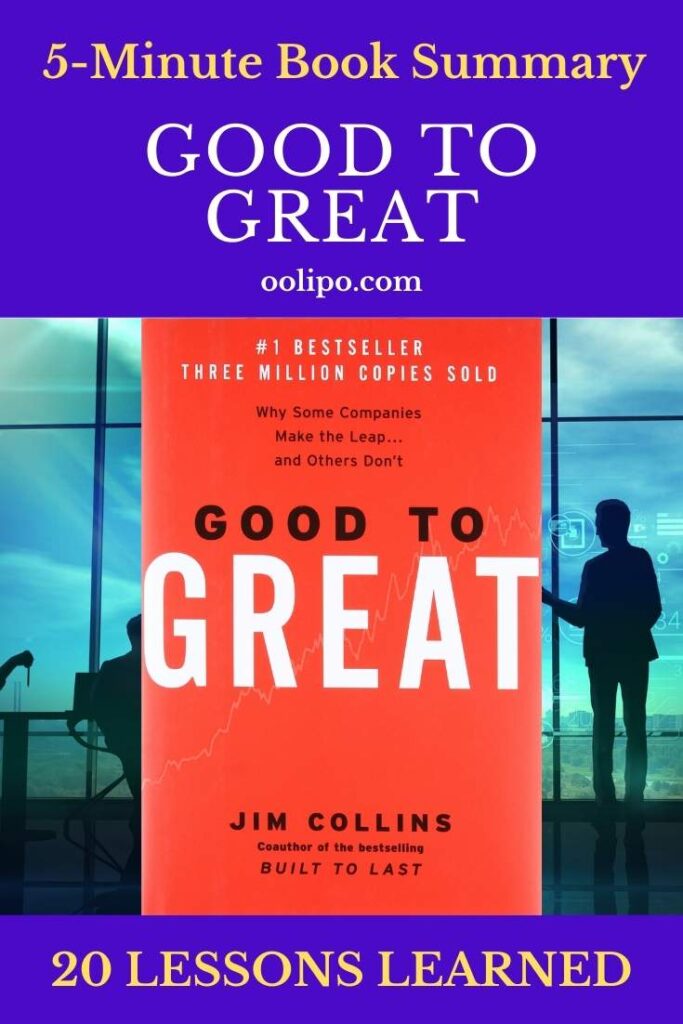Good to Great: Why Some Companies Make the Leap… And Others Don’t is a self-help book written by Jim Collins. In this Good to Great Summary, we will dive deep into Collins’ perspective on management and organizations.
Even companies that had a very good first year are not guaranteed to survive in the industry. Because companies that do not change and develop disappear. In his book, Collins tells us how companies change and develop and the strategies they should implement.

Good to Great Summary with 20 Lessons Learned
Here are the 20 lessons to learn from Good to Great Summary:
#1 Where to Start?
The place to start is where you are the best. The more you grow in the area you are best at, the more will follow in other areas. You should start your business life from a sector where you will earn less but you will earn, instead of a very profitable business where you do not know the sector.
#2 You Set the Direction
What you need to do as a company owner is to chart your team’s route and show targets. Companies that don’t know where to go disappear. Once you’ve made sure your team is sure of what to do, leave the rest to their abilities.
#3 Simple and Clear
Your goals should be simple and clear, not ordinary. Things may develop differently after you set off and your route may change with the skills you have just gained, but you should always be able to express this clearly. It’s okay as long as you don’t lose focus on what you’re the best at.
#4 Avoid Workarounds
Customers’ demands will change over the years. Accordingly, you will have to change your product. But these changes should not be made to save the day. You will lose in the long run. You should continue on the road with permanent, solid solutions.
#5 Change Must Be Constant
It is not wise to make radical changes in your company. You do it when you have to, but smart bosses make small changes at every opportunity. In this way, the team will not have difficulty adapting to these changes. It also allows you to keep customer satisfaction constantly high.
#6 Leadership
When you start your company, it is enough to be a talented leader in the first place. But over the years, if you do not gain new features, you will have difficulty in managing the company. Having a great product and team is meaningless unless there is a leader who can lead them.
#7 Being Up-to-Date
You cannot follow technological innovations and customer expectations alone. Here, too, you have to trust your team. You must guide them. You should strengthen your communication side. If the communication between the team is strong, the innovations that need to be made are expressed faster.
#8 Your Team Is Not Your Slave
Leaders who have achieved some success, in particular, tend to think that everything they do is right. Just as you can replace someone when a member of the team leaves, they can find another job when a member of the team leaves. Nobody needs anybody. But when a member of the team leaves, the time spent on finding a replacement and adapting the found person will be to the detriment of your company.
#9 Technology Advances
If it does not directly and benefit you, do not make a technological change in any area, from your production process to marketing. Some of the technological developments cannot go beyond just being stylish in terms of design, or it is a development that does not benefit you. Don’t waste your money and time in the zeal to make a change.
#10 Small Efforts
Do not underestimate any effort. Small changes, small differences accumulate over time. The small work done every day for a year can provide you with huge resources. Development work is accumulation work. You grow with knowledge and experience.
#11 Sunny Days
When you find a positive atmosphere in your company, use it to the fullest. This is a good opportunity to motivate you and your team and increase their performance. You can gain momentum that will last for years. It is also a good opportunity for the team to bond together.
#12 Dear People
Who you spend your time with will show you who you will look like in the future. Now stop and think. What about the people you talk to and exchange ideas with the most? Whoever you spend time with, you start to think like them. Surround yourself with positive and valuable people.
#13 Don’t Personalize Topics
From the moment you go to your company, everything is about the company. It’s all about getting your company to a better place. It’s normal to have egos and ambitions as a leader, but a good leader knows how to control those emotions. Because your company has to be more important than your ego.
#14 How Important Is the Idea?
If there is no idea, there is nothing to do. When you enter business life alone, you will see that there is nothing more than ideas. Everyone everywhere already has an idea that they believe will make great money. So why can’t they succeed? Because the difficult task is to establish the right team to bring that idea to life.
#15 Recruitment Process
Even after you set up your team, keep in touch with people in your mind who can work with you and include them in your team. As mentioned earlier in this Good to Great summary, you never know when someone might let you down. You can’t blame anyone for leaving you when they find a better job. The market does not hurt anyone. You have to be prepared and be able to fill everyone’s place.
#16 Don’t Try To Learn Everything
You, as the owner or a leader, are responsible for guiding your team. You don’t have to have the knowledge to do all the work in the company. All you have to do is make sure things work out. Do not make the mistake of trying to prove yourself to company employees.
#17 Don’t Chase Miracles
It is not an ordinary situation for someone who founded a company for the first time to become a millionaire in 3 months and make a worldwide impact. Since this is not a normal process, your dream when you start a job should not be such an unusual situation. Focus on leaping in a few years. Maybe it will be a little late or early, but keep your expectations in this direction.
#18 Emotions
Have no emotional attachment to any product or teammate. Products and teammates change constantly. Don’t put anyone in front of your company. There is no irreplaceable product or employee. At the same time, your place can be filled very easily.
#19 Perspective
After spending a lot of time in your industry, your creativity starts to dull and you can’t get away from ideas that are already working. After a while, you don’t know what to do when those ideas you trust so much don’t work. To avoid such situations, sometimes seek advice from people outside of your industry. You may learn something that will change your perspective because they won’t look at it the way you do.
#20 Going to the Top
It is the dream of every leader to be at the top in the sector they are in. It’s okay as long as this dream doesn’t make you cruel. Don’t be a slave to your greed. Focus on adding value to the world, developing products that will solve people’s problems and make their lives easier.
Top 10 Quotes from Good to Great
1. “The good-to-great leaders never wanted to become larger-than-life heroes. They never aspired to be put on a pedestal or become unreachable icons. They were seemingly ordinary people quietly producing extraordinary results.”
2. “The good-to-great companies probably sound like tough places to work and they are. If you don’t have what it takes, you probably won’t last long. But they’re not ruthless cultures, they’re rigorous cultures. And the distinction is crucial.”
3. “To let people languish in uncertainty for months or years, stealing precious time in their lives that they could use to move on to something else when in the end they aren’t going to make it anyway-that would be ruthless. To deal with it right up front and let people get on with their lives that is rigorous.”
4. “Those who build great companies understand that the ultimate throttle on growth for any great company is not markets, or technology, or competition, or products. It is one thing above all others: the ability to get and keep enough of the right people.”
5. “Letting the wrong people hang around is unfair to all the right people, as they inevitably find themselves compensating for the inadequacies of the wrong people. Worse, it can drive away the best people. Strong performers are intrinsically motivated by performance, and when they see their efforts impeded by carrying extra weight, they eventually become frustrated.”
6. “If technology is so vitally important, why did the good-to-great executives talk so little about it? Certainly not because they ignored technology: They were technologically sophisticated and vastly superior to their comparisons. Furthermore, a number of the good-to-great companies received extensive media coverage and awards for their pioneering use of technology.”
7. “The good-to-great companies had no name for their transformations. There was no launch event, no tag line, no programmatic feel whatsoever. Some executives said that they weren’t even aware that a major transformation was underway they were well into it. It was often more obvious to them after the fact than at the time.”
8. “We found a very different pattern at the comparison companies. Instead of a quiet, deliberate process of figuring out what needed to be done and then simply doing it, the comparison companies frequently launched new programs-often with great fanfare and hoopla aimed at “motivating the troops7 ‘-only to see the programs fail to produce sustained results.”
9. “To be clear, I am not suggesting that going from good to great is easy, or that every organization will successfully make the shift. By definition, it is not possible for everyone to be above average. But I am asserting that those who strive to turn good into great find the process no more painful or exhausting than those who settle for just letting things wallow along in mind-numbing mediocrity.”
10. “How a company reacts to technological change is a good indicator of its drive for greatness versus mediocrity. Great companies respond with thoughtfulness and creativity, driven by a compulsion to turn unrealized potential into results; nedşıcre companies react and lurch about, motivated by fear of being left behind.”
Free PDF Download of Good to Great Summary to Save or Print
We created a PDF file with the summary and quotes on this page for easy access: Download Good to Great PDF Summary. If you want to buy the paperback version of the book, check out this page.
Jim Collins’ 10 Rules for Success
Please share these important lessons by pinning this post to Pinterest.
